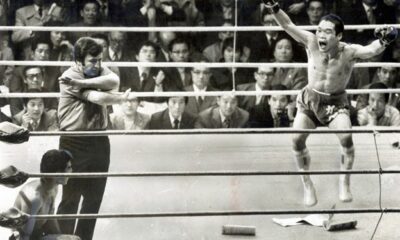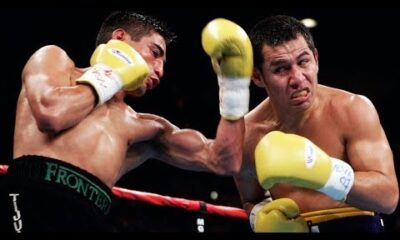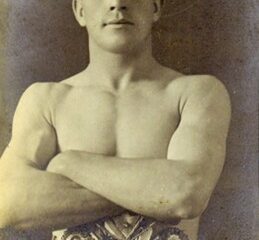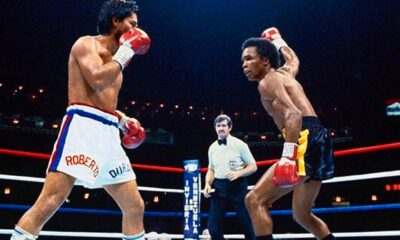Featured Articles
Alex Wallau: A Personal Remembrance
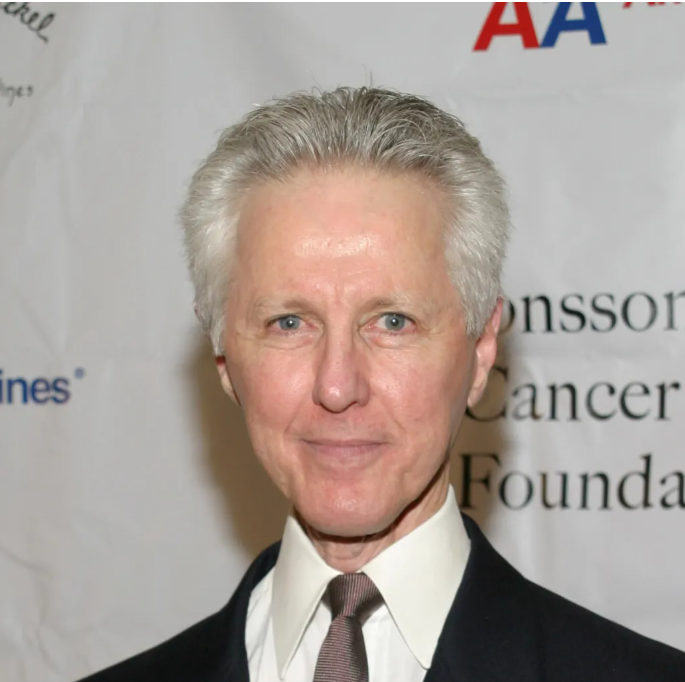
By Thomas Hauser — Alex Wallau died on Friday, October 10, at age eighty.
Wallau began his career at ABC Sports where he had a significant impact on the network’s boxing program. In 1987, he was diagnosed with stage-4 throat cancer. He did more than survive. He flourished. After recovering from cancer, he rose to extraordinary heights and ultimately became president of ABC. He was smart, courageous, and principled. The love and care of his wife of 58 years, Martha, sustained him throughout his life journey.
I met Alex in 1984. I was researching my initial foray into boxing writing – a book titled The Black Lights. Alex was a producer/director for ABC’s boxing program at a time when ABC, CBC, and NBC were the sport’s deep pockets.
“Our philosophy,” Alex explained to me, “is to identify the most talented and charismatic champions and put them in the best matches possible. If a match is competitive, if at least one of the fighters is attractive, and if the price is right, we buy it. The problem is, most matches offered aren’t competitive. No good manager wants to put his fighter in an even fight. Every one of them is looking for an edge. And beyond that, there are very few competitive matches you can make for a great fighter like Thomas Hearns or Marvin Hagler. The result is that, like the other networks, ABC puts on a few great fights, a lot of decent ones, and our share of mismatches. We’d love it if every fight was an all-out war between evenly matched fighters. That would be great for our audience and great for us, but you’d be looking at the worst-managed fighters in the world.”
There was a time almost a half-century ago when Wallau played Cassandra (the mythological Greek prophet whose curse it was to warn of impending disaster but not be believed).
In April 1976, Don King approached ABC sports with a plan to promote a tournament that would produce United States Boxing Champions in eight weight divisions. ABC committed to the project and agreed to pay Don King Productions the then-substantial sum of $2,035,000. King, in turn, agreed to build the tournament around records and ratings provided by Ring Magazine.
Ring’ s records and ratings were critical to the tournament. Indeed, the contract between ABC and Don King Productions specified that the “essence of the agreement” was that “the quality of fighters participating in each weight category be the best possible, determined by rankings established by Ring Magazine.” King himself later acknowledged, “This was the heart of the tournament. I needed their reputation, their ratings, and their sanction to give validity and authority to the tournament.”
Thereafter, Ring designated the top twelve United States fighters in the heavyweight, light-heavyweight, middleweight, welterweight, lightweight, and featherweight divisions, and the top six flyweights and bantamweights. The tournament was announced and invitations were distributed to fighters. Fighters who accepted were signed in order of rank. There were eight openings in each of the top six weight divisions, and four openings for the two lighter weight categories.
As a condition of entry, each fighter had to sign a contract giving Don King Productions three options should he win a tournament title. The bouts were to be staged in unique locations such as the Marion Correctional Institute in Ohio (where King had served time for manslaughter) and a United States Navy aircraft carrier. Only three of six announced tournament sites were subject to state athletic commission supervision.
Problems abounded from the start. Among the fighters excluded from the tournament despite a request by his manager that he be included was a Massachusetts middleweight with a 38-2-1 record named Marvin Hagler. Yet three men Hagler had beaten were invited to the tournament. Other omissions were similarly glaring. Teddy Brenner, then president of Madison Square Garden Boxing, publicly criticized the ratings with the declaration, “If Ring is the Bible of Boxing, then boxing needs a New Testament.”
On December 11, 1976, Wallau sent an internal memorandum to Jim Spence (vice-president of programming for ABC Sports). In it, Wallau expressed concern over the quality of fighters in the tournament and questioned the integrity of the selection process. Ten days later, he sent a follow-up memorandum covering all 56 tournament fighters. Only 25 were deemed by Wallau to be “qualified.” Fourteen were labeled “disgraces.”
Despite Wallau’s warnings, ABC Sports let the tournament begin. Then the venture imploded. Faced with a tidal wave of evidence regarding phony records, rigged ratings, and bribes, ABC suspended its telecasts of the tournament and issued a press release that declared, “ABC has determined that the records of numerous fighters in the tournament, as listed in the 1977 Ring Record Book, are inaccurate and contain many fights which apparently never took place. ABC believes that the very basis of the tournament has been severely compromised. As a result of these facts, ABC has suspended telecasts of the tournament until such time as it is satisfied that a more adequate mechanism has been put into effect that will guarantee the honesty and integrity of the tournament.”
The tournament never resumed.
“We feel we should do everything possible to put on a good show and be honest with the public,” Wallau said of the fiasco. “It’s not our proper role to turn activist and clean up the sport of boxing. We’re supposed to report the news, not manage it. [But] you can’t be a thinking person and not have moments when you’re repelled by it all.”
Later, Alex took on the additional role of serving as an expert analyst on ABC’s boxing telecasts. In 1987, he was honored by the Boxing Writers Association of America with the Sam Taub Award for Excellence in Broadcast Journalism.
My next encounter with Wallau came in early-1989. Once again, I was researching a book about boxing. This time, a biography of Muhammad Ali with Ali’s cooperation.
Alex’s life had taken a turn for the worse. He had just been operated on for laryngeal cancer. He woke up every morning knowing that his expected lifespan was very short.
We sat in the living room of Alex’s Manhattan apartment overlooking Central Park. Alex was wearing a white bathrobe. His throat was badly disfigured. Martha brought him several dishes of vanilla ice cream as we talked.
“It’s about all I can eat,” he told me. “And I have to keep weight on.”
“The thing that impressed me about Ali,” Alex said as our conversation progressed, “was his heart-slash-chin. He had the most amazing chin I’ve ever seen, and that includes all the fighters I’ve watched on old fight films. He had a remarkable capacity for recovery and also a remarkable ability to fight through pain. And he had guts. That’s one of the things that surprised people, especially the hard-bitten old-line fight crowd. They dismissed Ali as a creation of the media, a loudmouthed pretty-boy who would fold when the going got tough. But whatever was left of that criticism came to an end in Manila. What Ali did there was take his courage and show it to the world on terms any redneck could understand. Here it is. I’m giving it to you on a silver platter. I’m as tough and brave as any of those tough guys you admire.”
I researched and wrote Muhammad Ali: His Life and Times for twenty months. Finally, in September 1990, I journeyed to Muhammad’s home in Berrien Springs, Michigan (as I’d done many times before) to meet with Ali, his wife (Lonnie Ali), and Howard Bingham (Muhammad’s best friend). For ten days, we read every word of the manuscript aloud. By agreement, there was to be no censorship. The purpose of our reading was to ensure that the book was factually accurate.
One moment from our sessions in Berrien Springs stands out in my mind. Lonnie was reading a quote from Alex who, speaking of Muhammad’s physical decline, had told me, “When I see Ali today, I feel sad. But I don’t feel as badly as some people do because I know Ali doesn’t feel sorry for himself. He’s had a great life. He’s done more in his first forty-nine years than most people could do in forty-nine lifetimes. He’s reached heights that almost anyone would envy. He’s not bitter. He understands what boxing did for him. And nobody had a better ride than Ali.
“When Ali was growing up,” Alex continued, “there weren’t many avenues to excel available to a black kid from Louisville. So when people say, ‘Boxing is horrible; look what it did to Ali,’ I have to ask, ‘What kind of a life would he have had without boxing?’ Probably, it wouldn’t have been much. Certainly, it wouldn’t have compared favorably to the life he’s led. So even with foreknowledge of how things would turn out, I think if he had it to do all over, he’d live his life the same way. He’d still choose to be a fighter.”
As soon as Lonnie read those words, Muhammad sat up straight in his chair and said, “You bet I would.”
Several days later when I got home from Berrien Springs, I called Alex to tell him about Muhammad’s response.
“That’s very nice to hear,” he said. “Thank you.”
Thomas Hauser’s email address is thomashauserwriter@gmail.com. His most recent book – The Most Honest Sport: Two More Years Inside Boxing – is available at https://www.amazon.com/Most-Honest-Sport-Inside-Boxing/dp/1955836329
In 2019, Hauser was selected for boxing’s highest honor – induction into the International Boxing Hall of Fame.
Photo credit: Getty
To comment on this story in the Fight Forum CLICK HERE
-
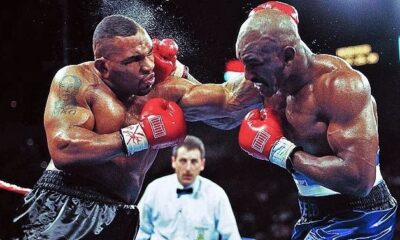
 Featured Articles3 weeks ago
Featured Articles3 weeks agoThis Day in Boxing History: Surprise, Legacy, and Transition
-
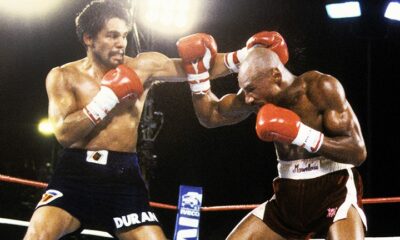
 Featured Articles3 weeks ago
Featured Articles3 weeks agoThis Day in Boxing History: Fights that Made November 10th Unforgettable
-
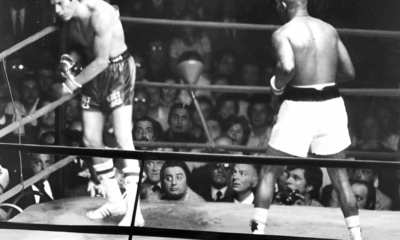
 Featured Articles3 weeks ago
Featured Articles3 weeks agoThis Day in Boxing History: From St. Louis to Buenos Aires
-
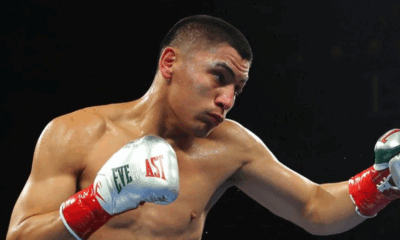
 Featured Articles3 weeks ago
Featured Articles3 weeks agoResults and Recaps from Texas where Vergil Ortiz Demolished Erickson Lubin
-
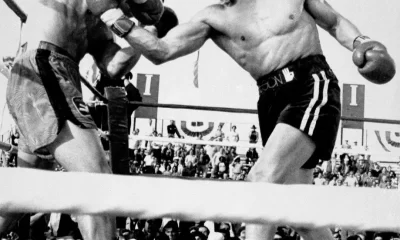
 Featured Articles2 weeks ago
Featured Articles2 weeks agoThis Day in Boxing History: A Date for Heavyweights, Shockwaves and Momentum
-

 Featured Articles3 weeks ago
Featured Articles3 weeks agoBoxing Odds and Ends: The Swedish Alliance and More Fight News
-
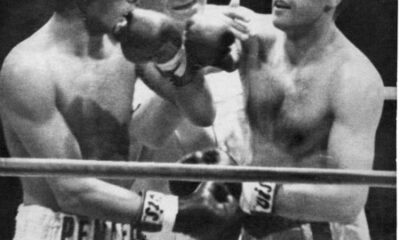
 Featured Articles3 weeks ago
Featured Articles3 weeks agoThis Day in Boxing History: Monzón’s Rise and Leonard’s Redemption
-
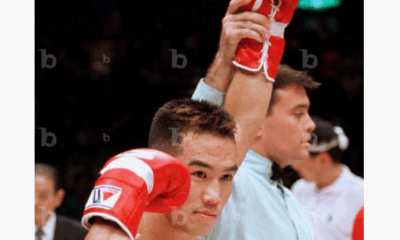
 Featured Articles3 weeks ago
Featured Articles3 weeks agoThis Day in Boxing History: Legacy, Redemption and Reinvention

